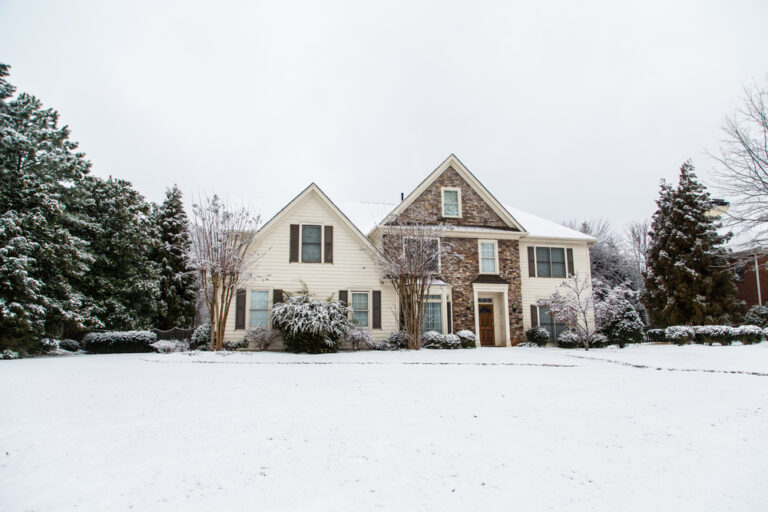While you are cozied up inside your home, staying warm during Edmonton’s frigid winter months, your septic system may struggle against the brunt of subzero temperatures.
Septic systems are designed to be robust but without preventative measures and maintenance, they could be affected by freezing temperatures. By protecting your system, you can prevent septic issues during the winter.
Here are some steps you can take to protect your system during Alberta’s cold winter months as well as what to do should you face issues due to cold temperatures and freezing.
How to Protect Your Septic System During the Winter
Once the temperatures hit the freezing mark, there is always the possibility that your septic system could freeze up. Most notably, it’s the pipes that lead from your house to the septic tank that are susceptible to freezing.
The tank, drainfield, and pipes leading to the drainfield can freeze as well.
Winterize Your Plumbing Pipes
If you’re not planning on staying in your house during the wintertime, it is best to winterize your pipes to avoid freezing and bursting. This involves draining all of the water from the pipes and emptying the water heater.
Some homeowners add antifreeze to their system but this is not recommended if you have a septic system because it will affect the bacteria in the septic tank.
Avoid Compacted Snow
While snow does work as a good insulator for the pipes connecting your septic system to your home, you need to make sure the snow is not compacted.
In order for the microorganisms in your septic tank to thrive, they require pore space which provides room for water and air to circulate amongst the matter. When the soil gets compacted over your septic system, there is no space for the air and water to pass through. If the snow becomes compacted on top of the system, it can cause frost to sink deeper and freeze the tank.
To prevent this issue, avoid walking, driving or exerting extra pressure over the septic tank.
Add Insulation
When there is not enough snow to provide insulation to your system, you may have to add some yourself. Straw, leaves, mulch, or hay can be added for extra insulation.
Insulation materials can be added onto exterior pipes but it’s best to have a qualified professional do this. Attempting this yourself can lead to dislodged pipes or harm to your plumbing system.
Expert plumbers, such as our team at Peak Sewer, are dedicated to implementing preventative measures to avoid issues in the future. We can make recommendations on replacing your pipes with insulating piping to prevent your plumbing from freezing.
Fix Leaky Faucets and Toilets
While allowing a slow stream of water to run from your faucets to prevent freezing is usually recommended, allowing leaks to continue in your home can cause problems in your septic system. These leaks will allow water to access the septic system which makes it difficult for bacteria to replenish in the septic tank. If there are not enough bacteria in the tank to break down waste, heat generation will drop and can lead to freezing.
How to Solve Septic System Problems in the Winter
We would love to tell you that you can fix septic issues in the winter but the truth is that a professional should be called to address these problems.
If you are tempted to remediate the problem yourself, be sure to avoid these mistakes:
- Do not add antifreeze or salt to your system. As mentioned above, this can negatively affect the natural bacteria in your septic tank
- Do not try to thaw the system out using fire – we only mention this because someone, somewhere, has tried
- Do not run water continually to thaw the system. While this may be a good preventative measure in some cases, it will not fix the problem
- Do not pour hot water down the pipes. If there is a complete blockage, this could cause your pipes to burst
The only safe DIY to try is to heat the section of pipe that is frozen. This only works if you can safely access that area. If you can, use a heat lamp to thaw out the pipe or an electric heater to warm the air and melt the ice, otherwise it is recommended that you call in the professionals.
Call the Edmonton’s Septic Experts!
Peak Sewers’ trained and knowledgeable technicians have the tools and skills to thaw your frozen septic lines and re-open the system.
Professionals can best evaluate the symptoms of your septic system in order to address the real issue. With special tools such as cameras, they can determine the source of the freezing can be determined and they can decide what type of repairs are needed. If your system is not frozen, plumbers can use heat tape and tank heaters to help your system maintain a regulated temperature. If it is frozen, professionals can use specialized tools to unfreeze the pipes.
Whatever the issue, the cause of the freezing must be fixed in order to prevent refreezing in the future. In a worst-case scenario, if the temperatures are too cold to fix the issue, a septic pumper can be used to empty out the tanks in the spring when they are too full.
The important thing is to not leave the health of your septic system in the wintertime to chance. Our trained team of technicians is on hand not only to help you fix any issues that arise in your septic system but we are also available to perform inspections and maintenance to prevent these problems from happening at all.
If you’re ready to gear up your septic system for winter, or need help fixing a septic system issue, please get in touch with us today!

